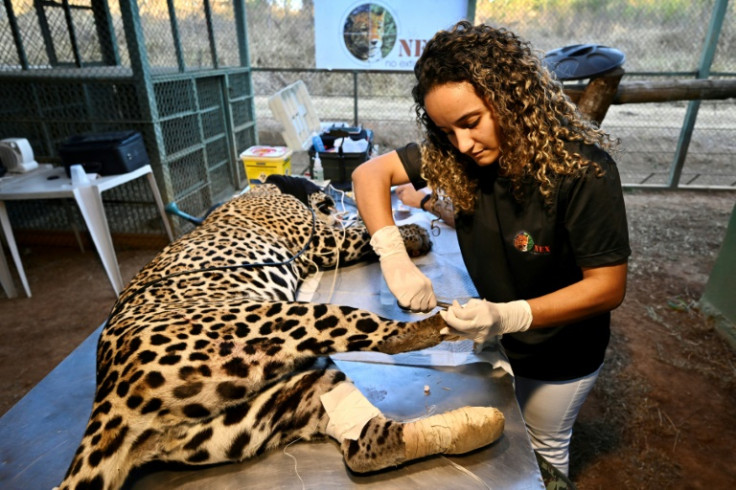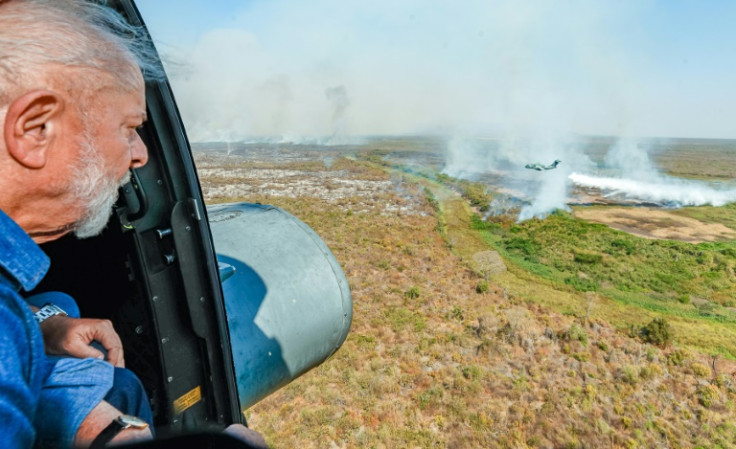Report Links Meatpacking Companies To 'War On Nature' In Brazil

A report by environmental and rights NGOs Tuesday linked three major meatpacking companies to illegal deforestation in Brazil, where farmers are accused of spraying herbicides from the sky to clear huge tracts of land.
The farmers used 2,4-D -- a herbicide found in "Agent Orange," infamously used in the Vietnam War -- to clear 81,200 hectares of the Pantanal wetland, a UNESCO World Heritage Site, said the report by Mighty Earth, Reporter Brasil and AidEnvironment.
Using "chemical deforestation," they thus cleared an area four times the size of Amsterdam for raising cattle in what is meant to be a sanctuary for biodiversity, it added.
The report accuses meatpackers JBS, Marfrig and Minerva of doing business with farmers engaged in the illegal actions.
They, in turn, supply beef products to retailers including Carrefour, Casino/GPA, Grupo Mateus and Sendas/Assai, it added.
"The deliberate killing of countless trees and wildlife in the Pantanal by aerial spraying of a highly toxic compound of 'Agent Orange' is a devastating new war on nature being waged by the beef industry," said Mighty Earth Brazil director Joao Goncalves.
Apart from killing plant life, the chemicals can contaminate water and endanger fish, animals, even human beings.
Vietnam blames Agent Orange, sprayed by US forces to destroy ground cover and food sources in their war with North Vietnamese troops from 1962 to 1971, for severe birth defects in 150,000 children.
One farmer implicated in the Pantanal "chemical deforestation" campaign has been charged with numerous environmental crimes and fined over $520 million.
From 2009 to 2023 overall, the report said JBS slaughterhouses were linked to nearly 470,000 hectares of deforestation and land use conversion in the Brazilian Amazon and the Cerrado tropical savanna.
"Including Marfrig and Minerva Foods slaughterhouses, the total area destroyed over this period rises above 550,000 hectares. Of this total, 55 percent is located in the Cerrado biome and 45 percent in the Amazon," it said.
The NGO report was published as the Pantanal, the world's biggest wetland, battles devastating wildfires that have, among other things, injured a number of jaguars -- listed as "near threatened" on the International Union for Conservation of Nature's Red List.
Authorities have said many of the fires were deliberately set, often to clear land for farming.
"The biome cannot withstand fire and rampant chemical deforestation," said Goncalves.
"The big beef companies need to urgently suspend all ranchers hell-bent on this destruction of nature for profit."
JBS in a response included in the report said the cases mentioned have not appeared in a database or an alert system it uses for monitoring.
The company added in a note to AFP that its policies do not "tolerate illegal deforestation."
Marfrig said that at the time it received cattle from a ranch mentioned in the report, the supplier had "met all the socio-environmental criteria."
Minerva said it had no business with the same farm.
Carrefour, for its part, said "none of the five farms mentioned is (a) supplier of the Carrefour Brazil group."

© Copyright AFP 2024. All rights reserved.




















